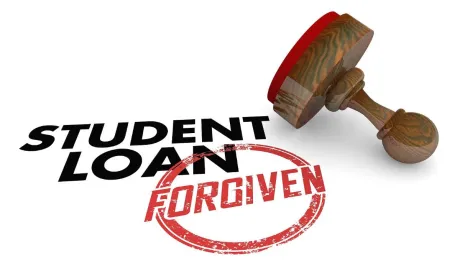Last week, the US Supreme Court ruled that the Biden Administration’s effort to cancel $430 billion in student loan balances was legally unsupportable.
Forty-three million Americans will remember Biden v. Nebraska when they begin making student loan payments again. For the rest of us, the 6-3 decision will likely be notable for the guidance it provides on when states have standing to challenge federal executive branch regulatory efforts and for providing this year’s refinements to the “major question doctrine.” We break down these issues below.
Case Background
Congress passed the Higher Education Relief Opportunities for Students Act (HEROES Act) in 2003. Under the terms of the law as modified in 2003, after the president has declared a national emergency, the Secretary of Education can “waive or modify any statutory or regulatory provision” relating to federal student loan programs to “affected individuals,” that is, those who “reside” or are “employed in an area that is declared a disaster area . . . in connection with a national emergency” so long as the Secretary deems relief “necessary to ensure” that loan repayment was not jeopardized. In 2022, invoking the HEROES Act, the Secretary of Education established the first comprehensive student loan forgiveness program, reducing or cancelling the loan balances of 43 million borrowers.
Federal student loans play a major role in the economy. Although the Secretary of Education characterized the 2022 loan forgiveness program as “waivers and modifications” authorized by the HEROES Act, the program would have reduced $430 billion in federal student loan debt balances owed by certain borrowers and eliminated student loan debts for many of them. Six states challenged the plan as exceeding the Secretary’s statutory authority. The Court reviewed the case after the Eighth Circuit issued a nationwide preliminary injunction.
Standing
We begin by analyzing standing, which is the legal principle that parties challenging conduct need to have an actual injury that could be remedied in litigation. (See here for a broader discussion.) While six states originally filed litigation challenging the Biden Administration’s loan forgiveness plan, by the time the case made its way to the Court, the case turned on whether Missouri had standing.
The Court found that Missouri had standing because the loan forgiveness plan harmed the Missouri Higher Education Loan Authority (MOHELA), a nonprofit, government corporation, that holds and services student loans. The Court’s standing analysis is based on MOHELA being an “instrumentality” of Missouri. Last year, MOHELA received nearly $89 million in revenue servicing $150 billion in student loans; Missouri estimated that the loan forgiveness plan would reduce MOHELA’s revenue by approximately $44 million per year. The Court found that MOHELA is “subject to the State’s supervision and control” as it “must provide annual financial reports to the Missouri Department of Education, detailing its income, expenditures, and assets.” Under the majority’s view, this nexus was enough for standing.
The three dissenting justices noted that MOHELA had the ability to sue on its own and that Missouri is “riding on someone else’s injury” by claiming MOHELA’s injuries as the basis for the State’s standing. The dissent also pointed to the fact that MOHELA isn’t present in this case directly or as an amicus, and that it neither participated in the decision to file suit nor cooperated in discovery. The Missouri Supreme Court had described a similar entity – the Missouri Health and Educational Facilities Authority (MOHEFA) – as “separate” from Missouri, and in the usual course, this would be dispositive. The dissenting justices reasoned that “[u]nder the non-manipulable, serious version of standing law, that would have been the end of this matter – regardless how much Missouri, or this Court, objects to the Secretary’s plan.”
On standing, Biden v. Nebraska appears to be an outlier, and the Court’s standing-related decisions this term have been largely uncontroversial. In two other cases, Haaland v. Brackeen and United States v. Texas, the Court analyzed whether states had standing to challenge executive-branch regulatory efforts and found that they did not. These holdings were echoed in Department of Education v. Brown – a companion case to Biden v. Nebraska, where dismissal for lack of standing was upheld by a unanimous Court.
Major Questions Doctrine
The HEROES Act permitted the Secretary to “waive or modify” certain regulatory provisions under the Higher Education Act of 1965, giving rise to federal student loan programs.
As discussed at the end of last term, the major questions doctrine is a tool the Court has increasingly used to strike down regulations which present legally novel applications of old statutory authorities and which impose significant costs on society. Last term, the major questions doctrine was featured in a decision evaluating the Occupational Safety and Health Administration’s (OSHA) vaccine mandates (see here) and the Environmental Protection Agency’s (EPA) greenhouse gas regulations in West Virginia v. EPA (discussed here).
In Nebraska v. Biden, major questions doctrine was applied by the majority in finding the Biden Administration’s loan forgiveness plan unlawful. In the majority’s view, the HEROES Act only permitted “moderate” or “minor” modifications to loan forgiveness programs, and the one here was “novel and fundamentally different” than permitted by the statute in that the plan benefitted nearly all student loan borrowers:
The Secretary’s plan has “modified” the cited provisions only in the same sense that “the French Revolution ‘modified’ the status of the French nobility”—it has abolished them and supplanted them with a new regime entirely.
In addition to its textual analysis, the majority noted that the Secretary had “never previously claimed powers of this magnitude under the HEROES Act.” Allowing the Secretary to do so now would allow the agency to rewrite the statute in a way that had been condemned in the West Virginia v. EPA decision, something which is impermissible in a situation where the regulations would have “staggering” “economic and political significance.”
Three Justices dissented on the grounds that the HEROES Act contemplated regulations like loan cancellations because a “national emergency” had been declared, persons whose loans had been cancelled or modified were “affected individuals,” and the Secretary had made all other findings necessary to trigger the “waive or modify” language in the statute. Accordingly, the whole of the statute permitted the Secretary to act as he or she deemed necessary, “to get rid of a requirement or, short of that, to alter it to the extent [the Secretary] think[s] appropriate.”
In the dissent’s view, the majority’s construction of “waive or modify” “makes the Act inconsequential because its reading leaves the Secretary “with no ability to respond to large-scale emergencies in commensurate ways.” In the view of the dissent, the majority reads “waive or modify” narrowly through use of the “major questions doctrine” because, in the end, the majority substantively dislikes the loan forgiveness program:
It insists that “[h]owever broad” Congress’s delegation to the Secretary, it (the Court) will not allow him to use that general authorization to resolve important issues. The question, the majority helpfully tells us, is “who has the authority” to make such significant calls.
In the dissent’s view, the loan forgiveness program should be upheld because the HEROES Act delegated the appropriate authority to the Secretary of Education to enact the program. “Delegations like the HEROES Act are designed to enable agencies to ‘adapt their rules and policies to the demands of changing circumstances . . . .’ Congress allows, and indeed expects, agencies to take more serious measures in response to more serious problems.”





 />i
/>i

